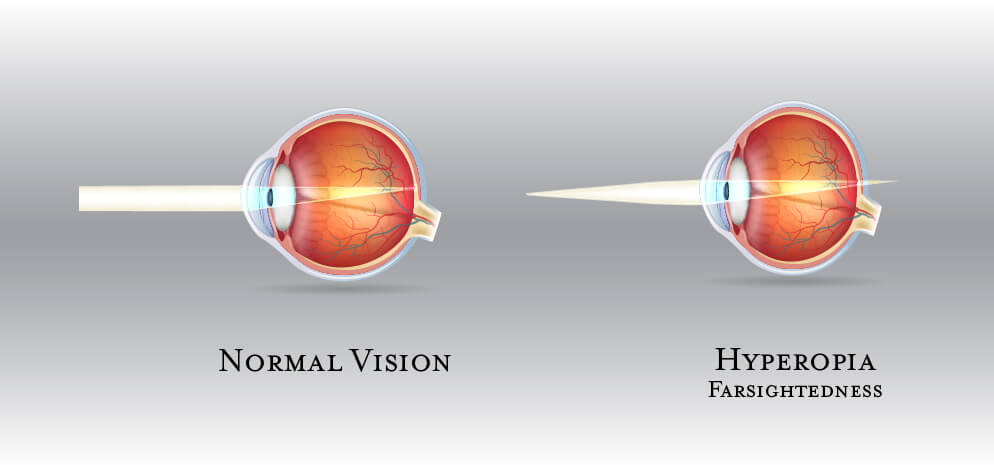Farsightedness
Farsightedness (also called hyperopia) is a refractive error in which distant objects appear clearer, while closer objects are more blurred. About 5 to 10 percent of Americans are farsighted.

What Are Symptoms Of Farsightedness?
People with farsightedness are able to focus better on objects far away than ones close up.
In addition to blurry near vision, other symptoms include squinting or straining along with mild to moderate headaches.
If you experience any of these symptoms while wearing your glasses or contacts, it’s likely time to schedule your next eye exam with an Optometrist at EyeCare Optical at one of our six convenient East Tennessee locations.
What Causes Farsightedness?
With normal vision, light passes through the cornea and is focused by the eye’s natural lens onto the surface of the retina. When someone is farsighted, the eyeball is often too short from front to back or the cornea is too flat, resulting in the image of an object up close being focused behind the retina rather than on its surface (opposite of nearsightedness).
How Is Farsightedness Treated?
Most farsighted people have good results with glasses or contact lenses that help to alter the way light enters their eyes. Depending on the degree of the farsightedness, correction may have to be worn all the time or only when better up-close vision is needed, like when reading or working at a computer. If your glasses or contacts prescription begins with a plus (+) symbol, that means you are farsighted.
Another treatment option for farsightedness is refractive surgery, which can reduce or eliminate the need for glasses or contacts. LASIK is an effective form of this procedure to treat farsightedness.
LASIK is the most common type of refractive surgery, which involves a thin flap being created on the surface of the cornea while a laser removes a precise amount of corneal tissue to reshape the eye. The flap is then returned to its original position, instantly sealing itself. The result is often greatly improved vision.
For extreme farsightedness, refractive surgery may not be the best option. In that case, your Ophthalmologist may suggest permanently implanting an intraocular lens (IOL) to correct the problem. In addition, corneal implants may be a future option to correct the vision in some cases.
Can Farsightedness Affect The Health Of My Eyes?
While farsightedness can become slightly worse as we age, it’s very rarely progressive and serious. In most cases, farsightedness is considered simply an inconvenience that just requires glasses or contacts for clear vision.
What Is The Difference Between Farsightedness And Presbyopia?
Presbyopia is a form of farsightedness that occurs solely due to age. As we get older, the natural lens of the eye becomes more rigid and much less flexible. This makes it more difficult to focus on objects close up. Presbyopia usually becomes noticeable around the early to mid-40s and progresses through the mid-60s. It affects almost all people by middle age.
People Over The Age Of 50 Should See An Eye Care Professional Every Year.
Regardless of the severity of your farsightedness, our staff would love the opportunity to help you achieve the best vision possible for you. Schedule your appointment with us today by calling (865) 584-0905. Our board-certified Optometrists at EyeCare Optical are standing by, ready to offer personal care and state-of-the-art technology with convenient locations in Fountain City (North Knoxville), Farragut, Hardin Valley, Maryville, Oak Ridge and Sevierville.


